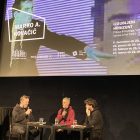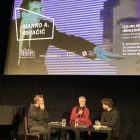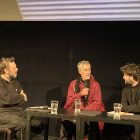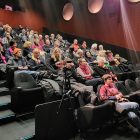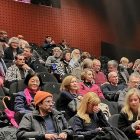Screening of Marko A. Kovačič’s film/video opus from 1983–2021
Screenings, exhibition and talks
Tuesday, 24 January 2023, 8 pm
Slovenian Cinematheque, Miklošičeva cesta 28, Ljubljana
PROGRAMME II
An overview of the author’s video works, from the legendary multimedia project Casus Belli to the first births of performative detective characters immersed in models, installations and images of the Disney-noir macro video world. In this world, the author also places the politically engaged grotesque No More Heroes Any More, and in the end he allows us to return to the everyday social realism of workers’ utopias and dystopias.
After the screening, Peter Cerovšek and Igor Prassel will talk to the artist.
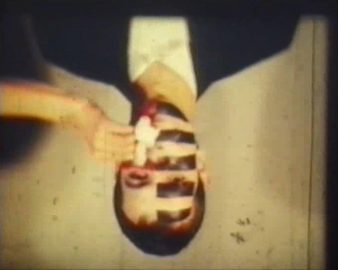
Marko A. Kovačič, Slovenia (Yugoslavia), 1983, digital format (shot on VHS), colour, 17′
» video
The video was created on the basis of a performance of the same name in the Škuc Gallery in Ljubljana in 1983, which took place at the intersection of constructed and real space, movement and static, figure silhouettes and a real vulnerable body.
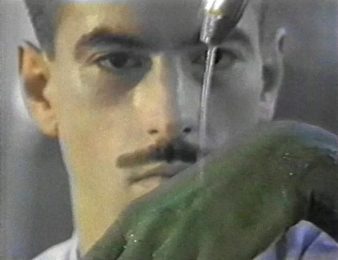
Marko A. Kovačič, Slovenia (Yugoslavia), 1985, digital format (shot on VHS and U-matic), colour, 16′
» video
The story of the narrative is based on the genre of crime fiction. The images are filled with citations from the history of art and cinema and refer to, for example, Man Ray and Sergei Eisenstein. The dynamics of the image is matched with the music is characterized by cinematic suspense.
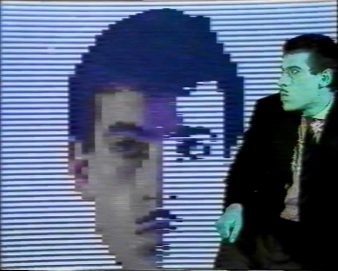
Marko A. Kovačič, Slovenia (Yugoslavia), 1987, digital format (shot on U-matic), bw, 2’30”
» video
The video was on the basis of a performance of the same name at the Glej Theater in Ljubljana. Using a digital mirroring effect and a time delay, the author splits the protagonist (himself) into the pursuer and the pursued.
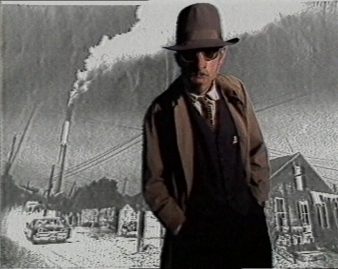
Marko A. Kovačič, Slovenia (Yugoslavia), 1986, digital format (shot on U-matic), colour, 6’45”
» video
An ambivalent deconstruction of the fantasy of the promised land and faith in art, which takes place in a stereotypical game of constant hide-and-seek. It is a dialectical confrontation of the kind of heroism of the regime, which operated with prohibitions and detachment from the people, with the announcement of a rapprochement with Western systems of liberal capitalism.
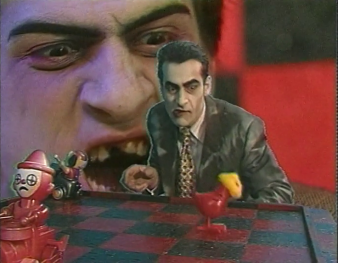
Marko A. Kovačič, Slovenia, 1992, digital format (shot on Beta SP), colour, 18’15”
» video
In a parodic and grotesque way, the video tackles the subject of war through a game of chess and refers to the war in Bosnia and the conduct of international politics with numerous references. It is a commentary on war, on the theater of military mechanics, and suggests that war is a game of strategy, that weapons are the toys of adults.
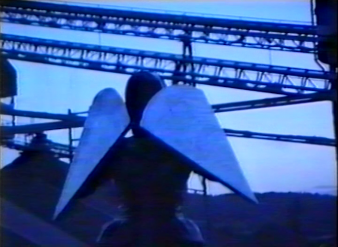
Marko A. Kovačič, Slovenia, 1993, digital format (shot on Video8), colour, 4′
» video
The video was created on the basis of a group performance in the urban environment Bellum contra solem of the Fusnet Association, which was staged in a block settlement in Nova Gorica on the summer solstice in 1991. The arrival of the Four Horsemen of the Apocalypse in fantastic futuristic costumes – the Conquest, War, Hunger and Death – in a Ljubljana sand pit illustrates the time around the declaration of Slovenian independence and the break away from the Yugoslav state.
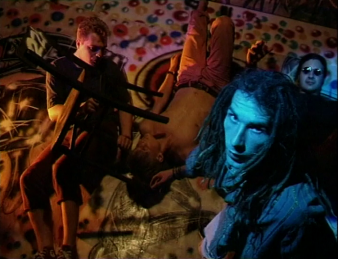
Marko A. Kovačič (music video of 2227), Slovenia, 1993, digital format (shot on Beta SP; Digital D3 mastering), colour, 6’20”
» video
The music video for the song I’ve seen that … Like it is by the Ljubljana music group 2227 combines footage of the concert and graffiti projections of the Strip Core collective.
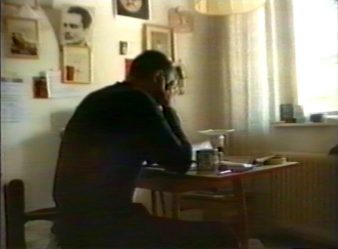
Marko A. Kovačič, Slovenia, 2000, digital format (shot on mini DV), colour, 1’20”
» video
A short one-minute video showing excerpts from newspaper articles about May Day celebrations and the author’s morning reflection on the changed meaning of this holiday.
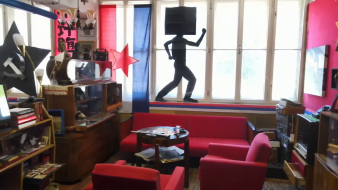
Marko A. Kovačič, Slovenia, 2021, digital format, colour, 2’40”
» video
During the corona pandemic in 2020 and 2021, the author opened Javka pri Rdeči zvezdi (Post at the Red Star) in the former Mehanika factory and now Ropotarnca in Trbovlje to the public. In the heart of the once proletarian and revolutionary Red Districts, he performed the most complex staging of his fascinating forty-year artistic process to date, and through art encompassed social periods full of contradictions and paradoxes.
Photo: SCCA-Ljubljana archive
Programme at the Slovenian Cinematheque (December 2022 – March 2023)
6 December 2022 / 24 January / 28 February / 23 March 2023
The programme prepared by: SCCA-Ljubljana and Slovenian Cinematheque
Curators: Barbara Borčić, Peter Cerovšek
The programme of Marko A. Kovačič‘s artistic opus with screenings, an exhibition and accompanying programme is being prepared in cooperation with the Slovenian Cinematheque. We keep his works in the archive of DIVA Station and have been systematically researching them recently, as the artist is one of the important representatives of film and video creativity in Slovenia. From now on, Kovačič’s film and video opus will also be stored in the archives of the Slovenian Cinematheque.
For the first time, Marko A. Kovačič’s works will be comprehensively put on display and for consideration by experts and the general public, as well as the younger generation, who may not yet be familiar with them. Short films and video works are rarely shown here in cinemas or on television, more or less they can only be seen at festivals (e.g. FeKK short film festival and V-F-X Ljubljana festival of experimental audiovisual practices). The program, which will also be partially accessible on the Slovenian Film Database (BSF) online, will take us through Kovačić’s forty-year opus with screenings once a month from December 2022 to March 2023, which includes narrative, performative, experimental and documentary works, from the early analog on magnetic tape (VHS, U-matic, Beta) to later digital formats.
Coproduction: SCCA-Ljubljana/DIVA Station and Slovenian Cinematheque
Partners: RTV Slovenija, Baza slovenskih filmov (BSF)
Supported by: Ministry of Culture of the Republic of Slovenia and City of Ljubljana – Department for Culture
![]()
![]()
![]()
![]()
![]()
![]()
![]()

